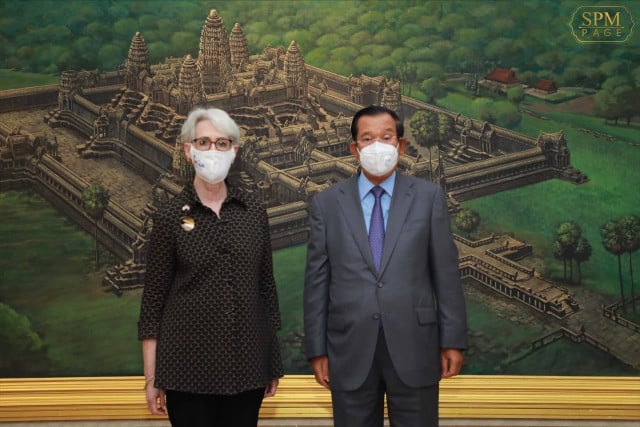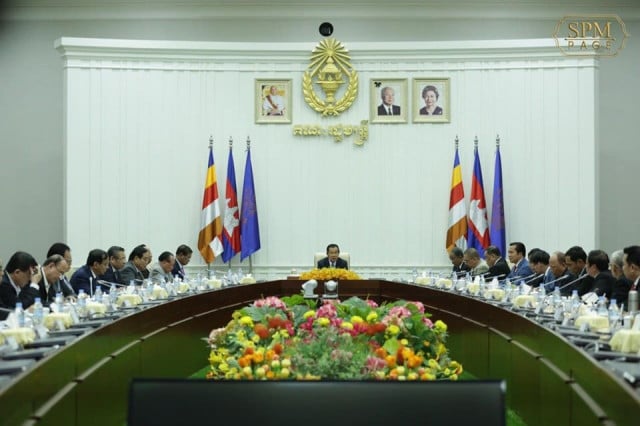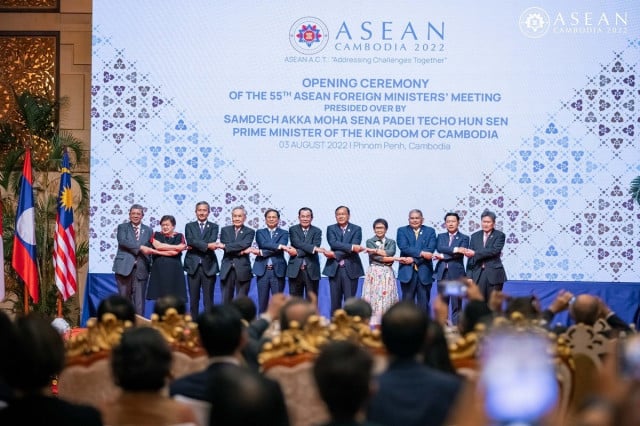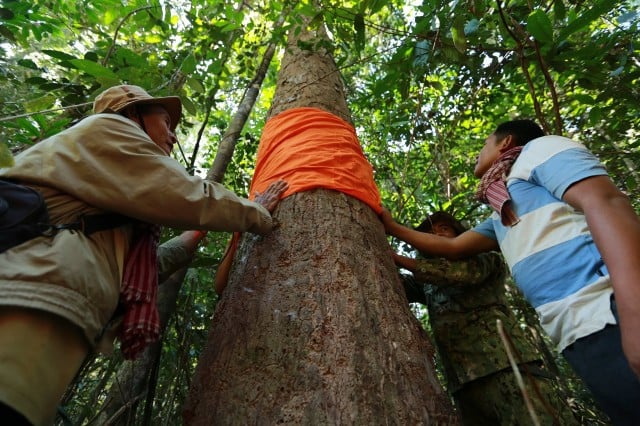US Deputy Secretary of State Called for “Reopening of Civil and Political Space” in Cambodia

- By Phoung Vantha
- June 2, 2021 5:46 PM
Towards the end of her whirlwind tour of Southeast Asia, US Deputy Secretary of State Wendy Sherman met with Prime Minister Hun Sen and called for the release of political opposition figures.
PHNOM PENH--On June 1, the United States Deputy Secretary of State Wendy Sherman met with Prime Minister Hun Sen in Phnom Penh as part of her diplomatic tour of Southeast Asia from May 25 to June 4, but Sherman only spent a day in Cambodia.
While relations between the US and Cambodia have deteriorated in recent years following Hun Sen’s dissolution of the Cambodia National Rescue Party and the subsequent crackdown on civil rights that followed, Sherman stressed that the US remains committed to the Cambodian people, noting her nation’s role in the signing of the Paris Peace Agreement in 1991 and the $3 billion in development assistance that the US had provided to Cambodia since then.
After what she called a “candid” meeting with Hun Sen, the US State Department issued a statement on the same day outlining areas of cooperation and issues upon which the two nations clashed.
The Cambodian government’s welcoming of US experts from the Center for Disease Control and Prevention and the two countries’ shared goal of tackling the COVID-19 pandemic and its social and economic implications was praised by Sherman, but serious concerns were raised over Cambodia’s sovereignty.
These concerns, the statement read, stemmed from the contentious issues surrounding Ream Naval Base and the level of Chinese involvement in developing what the US is concerned could become a stronghold for the Chinese navy.
According to the statement, Sherman “urged Cambodia’s leadership to maintain an independent and balanced foreign policy, in the best interests of the Cambodian people.”
Sherman also emphasized the importance of human rights and the protection of fundamental freedoms as integral to the bilateral relationship between the US and Cambodia. She reiterated calls that have been made repeatedly by the US—to no avail so far—for the Cambodian government to drop the politically motivated charges against political opponents, journalists and activists.
Cambodia’s human rights record, while long stained by decades of abuse under Hun Sen, has recently faced international scrutiny as the government has been accused of using the COVID-19 pandemic as cover for cracking down on dissent and cementing the ruling Cambodian People’s Party’s power through draconian legislation.
“As the most senior US official to travel to Cambodia in almost a decade, Sherman should strongly and publicly criticize Prime Minister Hun Sen’s wholesale destruction of democracy, media freedom, and human rights,” said Phil Robertson, deputy Asia director of Human Rights Watch, on May 31.
Robertson called for Sherman to push for the release of political prisoners, namely Kem Sokha, leader of the Cambodia National Rescue Party and drop charges against peaceful protesters and other activists who were jailed in record numbers over the course of 2020.
“Any ideas of a softly, gently approach to the Cambodian government is both misguided and morally bankrupt in the face of the systematic rights abuses committed daily by the government throughout the country,” said Robertson.
While Sherman called on the Cambodian government to open up both civil and political space in light of the forthcoming commune elections in 2022 and national elections in 2023, it is unclear how much of an impact her words have had on Hun Sen and his party.
A statement from the Ministry of Foreign Affairs and International Cooperation released on June 2 made no mention of Sherman’s requests regarding political freedoms in Cambodia. Instead the government’s statement chose to focus on self-promotion, once again reminding the world that it welcomed the US Westerdam cruise ship when COVID-19 cases were detected onboard.
The statement neglected to mention that Hun Sen personally greeted those disembarking from the ship without wearing a protective mask.
However, the government’s statement on Sherman’s meeting with Hun Sen did gently touch upon the Ream Naval Base contention saying that Hun Sen had “once again, clarified the situation at Ream naval base and reiterate the strong determination of the Royal Government of Cambodia to maintain and protect its independence, neutrality and sovereignty in both domestic and foreign policy.”
While making no promises to restore political freedoms and basic rights to his people, Hun Sen did suggest that the US considers converting 70 percent of Cambodia’s debt into development aid which, according to the statement, could be considered spent on “education, culture and removal of mines and explosive remnants of war.”
But having spent the day with Hun Sen, senior Cambodian officials and US diplomatic staff at the US Embassy in Phnom Penh, Sherman devoted the evening to meeting with civil society actors and the outlawed opposition leader Kem Sokha.
According to the State Department’s statement, the two discussed “issues of shared importance with the United States, including ensuring a peaceful, prosperous, sovereign, and democratic future for Cambodia.”
Executive director of the Cambodian Center for Human Rights (CCHR) Chak Sopheap who met with Sherman on the evening of June 1 said that Sherman had shared concerns over Cambodia’s straying from the spirit of the Paris Peace Agreement—this October will mark the 30th anniversary of the agreement’s signing.
“As a signatory to the agreement, the US and other stakeholders should continue to attach importance to building society not only in the absence of war but peace-building, including ensuring free and fair elections and the restoration of the human rights situation, especially fundamental freedoms, is a necessary part of the agreement,” said Sopheap.
The challenges facing civil society, especially activists arrested and charged because of their activism, such as Rong Chhun, two former Radio Free Asia journalists and young environmental activists, have been charged and detained—they should be released and the charges should be dropped, she added.















